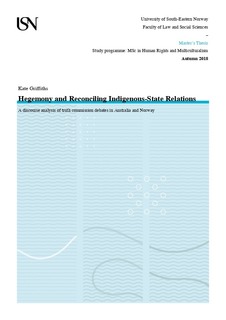Hegemony and Reconciling Indigenous-State Relations A discourse analysis of truth commission debates in Australia and Norway
Master thesis
Permanent lenke
http://hdl.handle.net/11250/2620315Utgivelsesdato
2018Metadata
Vis full innførselSamlinger
Sammendrag
This study emerges from the context of requests for truth commissions by indigenous populations in Australia and Norway between 2016-2017. In both western liberal democracies, these requests reflected a need felt to reconcile the ongoing discrimination and intergenerational trauma felt by the national minorities, but also the struggle to access their international group rights. Critical discourse analysis of selected political and public texts in the national debates is combined with semi-structured interviews, to perform a comparative analysis of the Australian and Norwegian cases. Through the discourse, the study explores hegemonic power structures within the cases, and the implications of these power asymmetries for understandings of recognition and reconciliation. Using Gramsci’s cultural hegemony and Fairclough’s critical perspective as a theoretical framework, the analysis reveals that despite increased international attention on indigenous group rights, both Australia and Norway maintain hegemonic structures to prioritise national sovereignty over international human rights. Identity politics are part of the counter-hegemonic movement by indigenous groups, seeking more practical and substantial understandings of reconciliation and recognition, driven from minority voices
